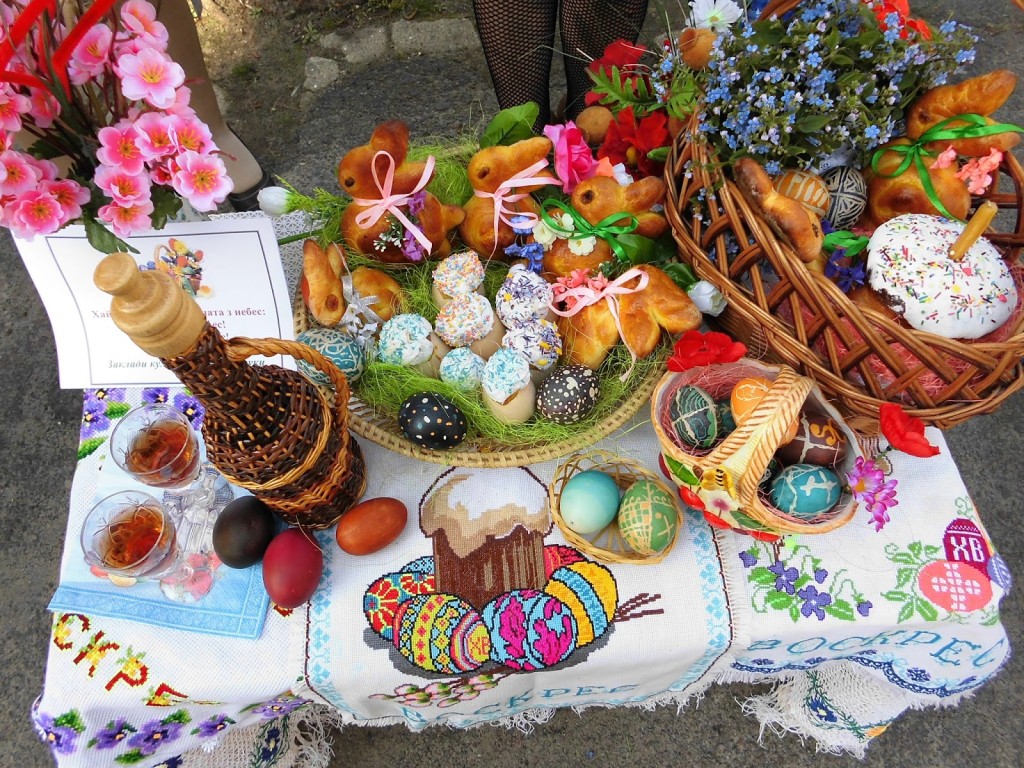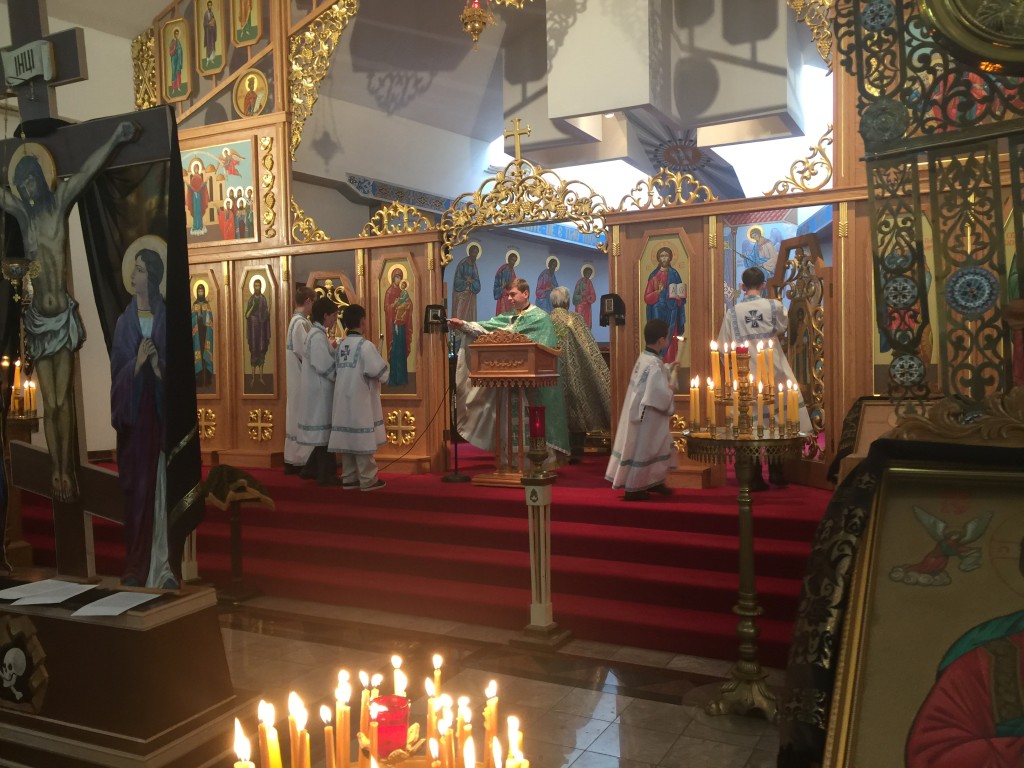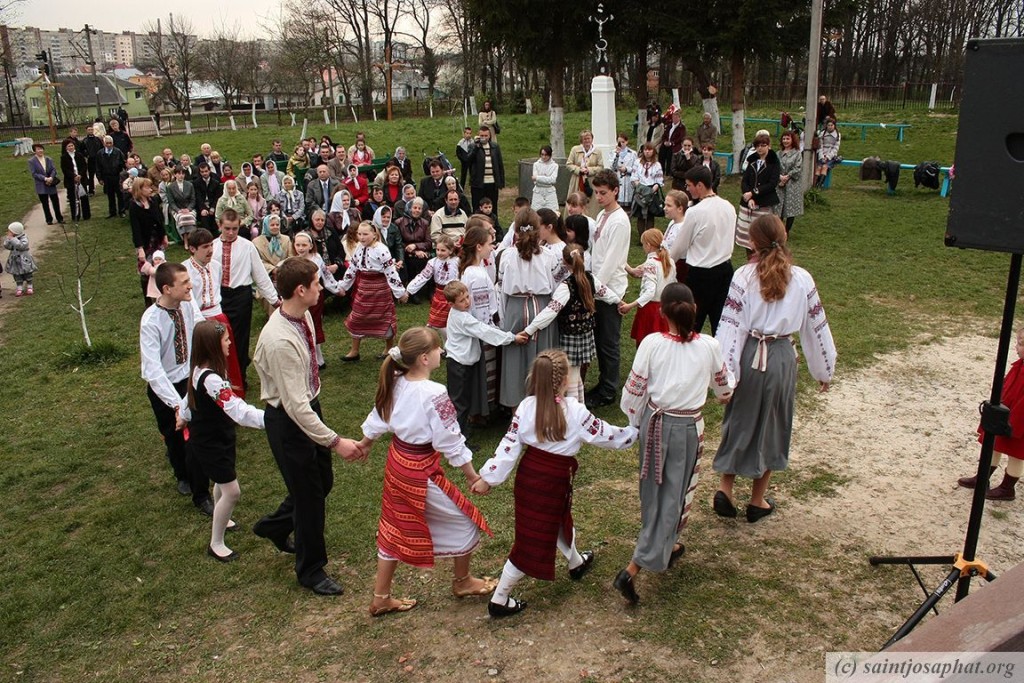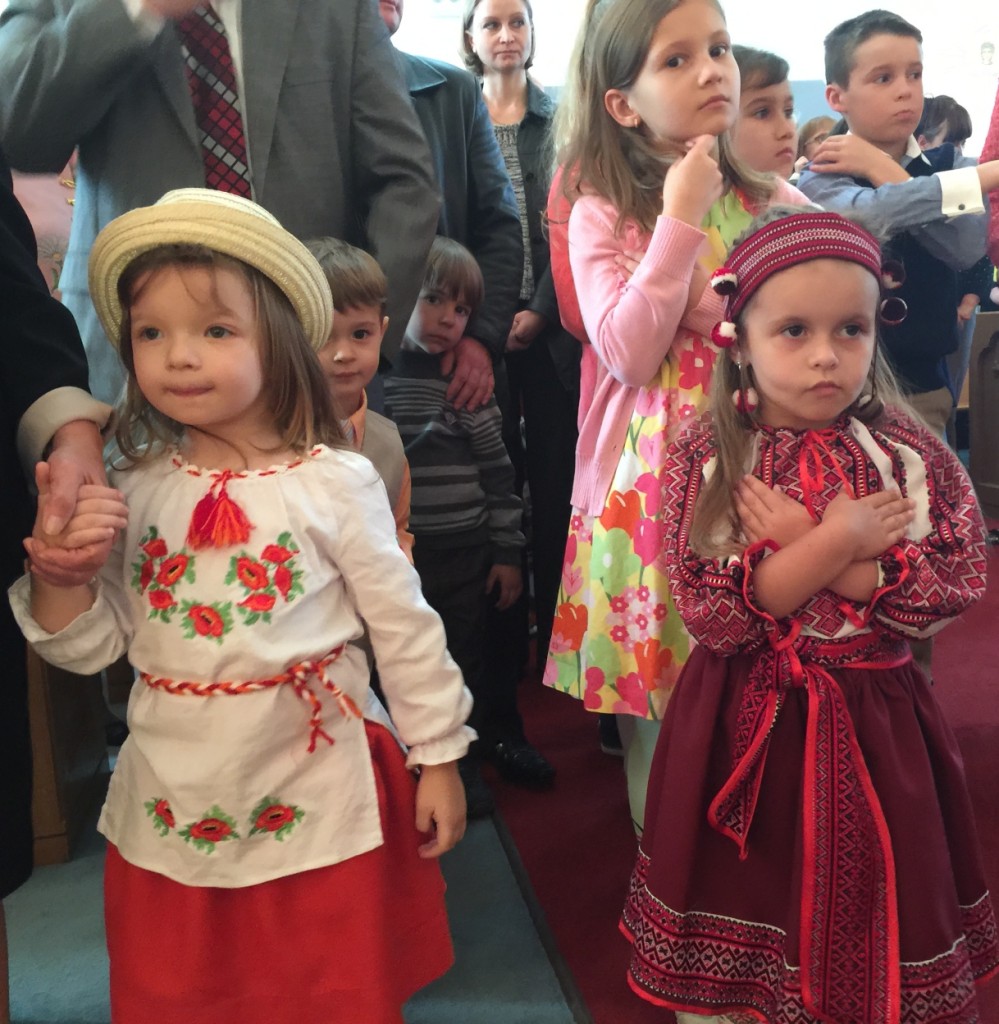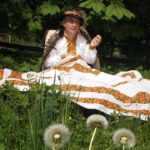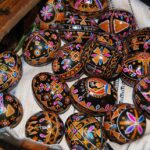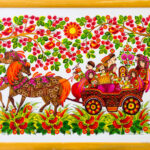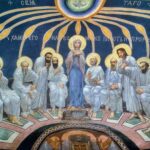Khrystos Voskres!”(Christ is Risen!),
“Voistyno Voskres!”(He is Truly Risen!)

The traditional greetings and replies spoken by Ukrainian Christians around the world during Easter.
The celebration of Easter is welcomed with great enthusiasm not only for its spiritual enlightenment but also for its deep rooted cultural traditions. Since the introduction of Christianity to Ukraine by Prince Volodymyr in 988 AD, Ukrainians have become devout and faithful followers of our Lord Jesus Christ. This is why the church is at the core of being one of the founding corner stones in the building of Ukrainian communties. The lively, beautiful and colourful traditions of Ukraine, whether religious or cultural, have been passed down from generation to generation. Together, young and old are seen hand in hand experiencing these joyous times, sharing the wonderous gifts that were once celebrated by their forefathers.
Resurrection Services
Easter Sunday morning in the Ukrainian tradition begins at sunrise. That is when the faithful arrive for Resurrection Services. The service before the Divine Liturgy consists of a procession which circles the church three times. The journey is made to symbolize the trip of the women to the tomb to anoint the Body of Christ on that first Easter morning. The makeup of the procession is similar to the one on Good Friday, led by a worshipper carrying the crucifix and altar boys using the kalatala (wooden clappers). Parish elders carry the Plaschenytsia (Holy Burial Shroud).
After the third passage, the procession stops in front of the church doors, which symbolize the impossibility of being able to enter the Kingdom of God before the Resurrection of Jesus Christ. The priest sings the joyful Easter song “Khrystos Voskres” (“Christ is Risen”) the first time himself. All of the faithful repeat the triumphant hymn a second time. Then, striking the doors of the church with the crucifix to open them, the priest begins “Khrystos Voskres” a third time, as the congregation joins in. This dramatic entrance reminds us that Heaven is now available to all because our Savior has conquered death with His death. All enter the church and the Divine Liturgy of Easter, the Great Day, begins.
Khrytos Voskres – Christ Is Risen
Many times during the Easter Sunday Liturgy, the happy refrains of “Khrytos Voskres” are sung by the congregation. It is sometimes difficult for church visitors to understand why this tune, and its variations, is repeated so frequently during the Easter season. We should remind our visitors that in the Resurrection of Jesus, we are all resurrected from the bonds of death. Our joyful Easter tune, “Sohlasmo Zaspivaimo” perhaps says it best when it proclaims “With His death He conquered death, and to those in their graves He granted Life!”
Voistynu Voskres – Indeed He Is Risen
Following the Easter Sunday Resurrection Services and Divine Liturgy, Ukrainian families would gather outside the church and exchange the joyful greeting “Khrystos Voskres”! That would be answered with the equally cheerful “Voistynu Voskres”! Hugs and kisses for long absent friends and family would follow, as many would come great distances to be together on this holiday.
The family would then return home, where the traditional blessed Easter foods basket would be brought out. The father or head of the household would then begin the Easter breakfast by taking one of the blessed hard boiled eggs and dividing it up among the family members. As each member is given a piece of the egg, the father would proclaim “Khrystos Voskres”! The member would reply “Voistynu Voskres”! The passing out and consumption of the egg was a very important start to the meal. The egg symbolized new life and the Resurrection of Christ, and therefore, the basis of the entire celebration. In eating it together, family unity was strengthened, as was the prospect for a healthy and happy year ahead.
Ringing of the Church Bell
Often, while the family was still having the Easter breakfast, the sound of the joyous ringing of the church bell would be heard. The ringing was done to proclaim the joy of the Resurrection of our Lord. The task was accomplished by one of the boys of the village. He would have been the first to hurry home, have his Easter family breakfast and run back to the church. It was considered an honor to do the Easter morning bell ringing, and whoever the fleet footed lad was who accomplished the ringing was then predicted to be the First in many accomplishments in the coming year.
Easter was celebrated for three days
In Ukraine, Easter was celebrated for three days. There was usually no work done, much food consumed and many hours spent in church, as well as with family and friends. Being such a happy time, there were also stories told and games played by the children. Among the games was the rolling of the krashanky (plain colored, hard boiled eggs. single egg: “krashanka”, from the word “kraska”, meaning “color”). There were many variations of that game. The one popular among the girls was the line rolling. In that, girls would stand in two parallel lines and roll the eggs back and forth between partners. The two girls with the last remaining un-cracked egg would win all of the eggs that had cracked. Another game with krashanky was known as “chockamia”. In this game, two children would tap each others eggs together until one of the eggs cracked. The winner, whose egg did not crack, got to keep the cracked egg. Older children would do the airborne variation of the parallel line game. The eggs would be thrown between the teenagers in the lines. Again, the team with the last un-cracked egg would be the winner.
Remembering Those Who Passed Away
Easter celebrations traditionally extend into the next week in Ukraine.
The week after Easter is also a time for memorializing the dead in Ukraine. Families bring baskets of food and small gifts to cemeteries and leave them for their ancestors. This is often a religious ceremony, accompanied by a priest who blesses the graves. Every region and village has it its own day for this ceremony but usually it stays within the range of 1 week after the Easter Sunday. Thankfully for this tradition I became knowledgeable about my great-great relatives, stories of their lives and where I come from.
From start to finish, Ukrainian Easter is a long holiday season: all the way from Palm Sunday a week before Easter to the graveyard visits a week after! Of course in modern life for many families Easter traditions are no more than Saturday trip to the closest market to buy Paska, meat and Krashanky. Years of Soviet Union time did not help to pass real traditions to young people, but thanks to our dear Ukrainian “babushkas” all the extended customs are kept alive. Many of the traditions are unique to Ukraine, and will hopefully go on flourishing for many more generations.

